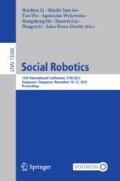Abstract
The capability of executing proper recovery strategies for different types of error situations is important for collaborative robots implemented in everyday lives. To understand people’s perception on the effective robot reaction to robotic failure, we conducted an online study where we asked participants to rate seven different robot reactions to handle three different types of error situations. An analysis of the result shows that in general, robots that employ error recovery strategies are rated significantly better than those who ignore the error situations. The strategy in which the robot expresses its regret for its own errors had the highest average rating in terms of anthropomorphism, while the strategy in which the robot apologises for its errors had the highest average likeability and perceived intelligence ratings. Further analysis show that the recovery plans are rated better if implemented in planning errors compared to social norm violations. Finally, we found that user’s gender and personality traits significantly affect participants’ ratings on error handling strategies, which suggests that personally-tailored error handling strategies might work best for future collaborative robots.
Access this chapter
Tax calculation will be finalised at checkout
Purchases are for personal use only
References
Bartneck, C., Kulić, D., Croft, E., Zoghbi, S.: Measurement instruments for the anthropomorphism, animacy, likeability, perceived intelligence, and perceived safety of robots. Int. J. Soc. Robot. 1, 71–81 (2009). https://doi.org/10.1007/s12369-008-0001-3
Bates, D., Mächler, M., Bolker, B.M., Walker, S.C.: Fitting linear mixed-effects models using lme4. J. Stat. Softw. 67(1) (2015)
Cahya, D.E.: Ditoec/appropriate-robot-reactions-user-study (2021). https://github.com/ditoec/appropriate-robot-reactions-user-study
Cahya, D.E., Ramakrishnan, R., Giuliani, M., et al.: Static and temporal differences in social signals between error-free and erroneous situations in human-robot collaboration. In: Salichs, M.A. (ed.) ICSR 2019. LNCS (LNAI), vol. 11876, pp. 189–199. Springer, Cham (2019). https://doi.org/10.1007/978-3-030-35888-4_18
Chrdileli, M., Kasser, T.: Guilt, shame, and apologizing behavior: a laboratory study. Pers. Individ. Differ. 135, 304–306 (2018)
Giuliani, M., Mirnig, N., Stollnberger, G., Stadler, S., Buchner, R., Tscheligi, M.: Systematic analysis of video data from different human-robot interaction studies: a categorization of social signals during error situations. Front. Psychol. 6(July), 931 (2015)
Hoorn, D.P.M.V.D., Neerincx, A., Graaf, M.M.A.D.: “I think you are doing a bad job !” The effect of blame attribution by a robot in human-robot collaboration. In: Proceedings of the 2021 ACM/IEEE International Conference on Human-Robot Interaction (HRI 2021), pp. 140–148 (2021)
Knepper, R.A., Tellex, S., Li, A., Roy, N., Rus, D.: Recovering from failure by asking for help. Auton. Robots 39(3), 347–362 (2015). https://doi.org/10.1007/s10514-015-9460-1
Kwon, M., Huang, S.H., Dragan, A.D.: Expressing robot incapability. In: ACM/IEEE International Conference on Human-Robot Interaction (2018)
Lee, M.K., Kiesler, S., Forlizzi, J., Srinivasa, S., Rybski, P.: Gracefully mitigating breakdowns in robotic services (2010)
McTear, M., O’Neill, I., Hanna, P., Liu, X.: Handling errors and determining confirmation strategies-an object-based approach. Speech Commun. 45(3), 249–269 (2005). Special Issue
Soto, C.J., John, O.P.: Short and extra-short forms of the Big Five Inventory-2: The BFI-2-S and BFI-2-XS. J. Res. Pers. 68, 69–81 (2017)
Takayama, L., Dooley, D., Ju, W.: Expressing thought: improving robot readability with animation principles. In: HRI 2011 - Proceedings of the 6th ACM/IEEE International Conference on Human-Robot Interaction (2011)
Uchida, T., Minato, T., Koyama, T., Ishiguro, H.: Who is responsible for a dialogue breakdown? An error recovery strategy that promotes cooperative intentions from humans by mutual attribution of responsibility in human-robot dialogues. Front. Robot. AI 6(APR), 1–11 (2019)
Weber, K., Ritschel, H., Aslan, I., Lingenfelser, F., André, E.: How to shape the humor of a robot - social behavior adaptation based on reinforcement learning. In: International Conference on Multimodal Interaction (ICMI 2018), pp. 154–162 (2018)
Acknowledgments
The first author acknowledges the scholarship support from the Ministry of Research and Technology of Republic of Indonesia through the Research and Innovation in Science and Technology (RISET-Pro) Program (World Bank Loan No. 8245-ID).
Author information
Authors and Affiliations
Corresponding author
Editor information
Editors and Affiliations
Rights and permissions
Copyright information
© 2021 Springer Nature Switzerland AG
About this paper
Cite this paper
Cahya, D.E., Giuliani, M. (2021). Appropriate Robot Reactions to Erroneous Situations in Human-Robot Collaboration. In: Li, H., et al. Social Robotics. ICSR 2021. Lecture Notes in Computer Science(), vol 13086. Springer, Cham. https://doi.org/10.1007/978-3-030-90525-5_15
Download citation
DOI: https://doi.org/10.1007/978-3-030-90525-5_15
Published:
Publisher Name: Springer, Cham
Print ISBN: 978-3-030-90524-8
Online ISBN: 978-3-030-90525-5
eBook Packages: Computer ScienceComputer Science (R0)

